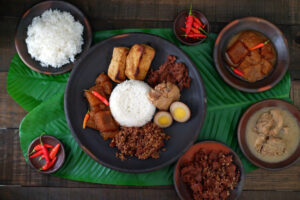Is Indonesian Food Spicy? Exploring the Bold Flavors of Indonesian Food at Madura Restaurant.
Indonesian cuisine is known for its rich variety of flavors, vibrant ingredients, and unique blends of spices. But one of the most common questions food enthusiasts ask is: Is Indonesian food spicy? The short answer is yes, but with a delicious complexity that goes beyond just heat. For those in Jeddah or anywhere around the globe, enjoying a meal at an authentic Indonesian restaurant like Madura Restaurant will introduce you to a wonderful balance of spiciness, sweetness, and savory flavors.
Is Indonesian Food Spicy to Eat?
Indonesian food varies widely across the archipelago, and while many dishes are indeed spicy, it’s important to note that the heat levels can differ from dish to dish. Traditional Indonesian recipes often incorporate chili peppers, herbs, and spices that give the cuisine its characteristic warmth and flavor. However, you can always adjust the level of spiciness according to your preference. For those unaccustomed to spicy food, the heat in Indonesian dishes is usually manageable and adds depth rather than overwhelming the palate.
Which Country’s Food Is Too Spicy?
When comparing the spiciness of food across different countries, many people often wonder how Indonesian food stacks up. Countries like Thailand, India, and Mexico are also known for their spicy cuisines. However, Indonesian food has a unique flavor profile where spiciness is often balanced with ingredients like coconut milk, palm sugar, and tamarind. While Indonesian dishes can get quite hot, they are not always as fiery as some of the spiciest offerings from countries like Thailand or India. This makes Indonesian food flavorful and layered, with just the right amount of heat for most people.
Is Thai or Indonesian Food Spicier?
When comparing Thai and Indonesian food, Thai cuisine is often considered spicier by many food experts. While both cuisines use chili as a primary ingredient, Thai food tends to lean on intense, fresh heat from bird’s eye chilies. Indonesian food, on the other hand, uses a variety of chilies but blends them with other elements like fermented shrimp paste, lemongrass, and coconut, making the heat more subtle. For example, popular Indonesian dishes like Rendang or Sambal deliver heat, but it is usually more nuanced compared to some of the spicier Thai dishes.
Indonesian Spicy Sauces
One of the highlights of Indonesian cuisine is its array of spicy sauces and condiments. Indonesian spicy sauces or Sambal are integral to the dining experience. They are often served on the side, allowing you to control how much spice you add to your meal. Made from a mix of chili peppers, garlic, shallots, and sometimes shrimp paste, these sauces are flavorful and can vary from mildly spicy to extremely hot.
Indonesian Spicy Sauce List:
Here are some of the most popular spicy sauces you can expect to find in Indonesian cuisine:
- Sambal Oelek – A simple, fresh chili paste made with ground red chilies and salt. It is one of the spiciest variants and is often used as a base for other sambals.
- Sambal Terasi – A pungent, spicy sauce made with shrimp paste, red chilies, and lime juice. It’s a favorite in many Indonesian households.
- Sambal Matah – A raw, spicy relish from Bali, made with chopped shallots, lemongrass, and chilies, offering a fresh and fiery kick.
- Sambal Bajak – A milder, slightly sweeter sambal cooked with garlic, tamarind, and palm sugar.
Each sauce brings its own unique flavor to Indonesian dishes, and you can often find them served at traditional restaurants like Madura Restaurant in Jeddah.
Indonesian Chili Paste Recipe
If you’re feeling adventurous and want to try making a chili paste at home, here’s a basic Indonesian chili paste recipe you can start with:
Ingredients:
- 5-6 red chilies
- 3 cloves garlic
- 2 shallots
- 1 tablespoon shrimp paste
- 1 tablespoon sugar
- Salt to taste
- 2 tablespoons oil for frying
Instructions:
- Grind the chilies, garlic, and shallots together in a mortar and pestle until smooth.
- In a small pan, heat the oil and add the shrimp paste, frying until fragrant.
- Add the ground chili mixture and fry for 2-3 minutes.
- Season with sugar and salt to taste.
- Remove from heat and serve as a spicy condiment for rice or noodles.
This recipe can be adjusted for spiciness by adding more or fewer chilies, depending on your preference.
Indonesian Food List: Must-Try Spicy Dishes
When exploring Indonesian food, there are several dishes that highlight the country’s love for spice. Here are some must-try options for anyone curious about the best flavors Indonesia has to offer:
- Rendang – A rich, slow-cooked beef dish with coconut milk and a blend of spices, including chilies.
- Ayam Penyet – Fried chicken served with a side of fiery sambal.
- Sate Padang – Spicy beef satay skewers, served with a thick, peppery sauce.
- Ikan Bakar – Grilled fish coated in a spicy marinade of chilies and garlic.

Each dish offers its own level of spiciness, making it a great way to explore the full range of Indonesian flavors.
Indonesian Food for Vegetarians
For those who follow a vegetarian diet, Indonesian cuisine has plenty to offer. You might wonder, Is Indonesia good for vegetarians? Absolutely! Many Indonesian dishes are made from plant-based ingredients like tempeh, tofu, and vegetables, and they can be enjoyed with or without spicy sambals. For example, Gado-Gado is a popular Indonesian salad made with boiled vegetables, tofu, and peanut sauce. Another favorite is Tempeh Goreng, which is fried fermented soybean cake, often served with rice and sambal.
Is Indonesian Food Spicy Yet Vegetarian-Friendly?
Yes, it’s entirely possible to enjoy spicy Indonesian food while maintaining a vegetarian diet. Many spicy sauces and dishes can be adapted for vegetarians, ensuring that you don’t miss out on the bold flavors of Indonesian cuisine, even without meat.
Conclusion:
So, Is Indonesian food spicy? The answer is a delightful yes! Indonesian cuisine offers a wide spectrum of flavors, from the mild to the intensely spicy, allowing you to customize your meal to your heat tolerance. Whether you’re in Jeddah at Madura Restaurant or exploring Indonesian food for the first time, you’ll find a delicious variety of spicy sauces, vegetarian options, and flavorful dishes that showcase the best of Indonesia’s culinary heritage.
Ready to try some authentic Indonesian flavors? Visit Madura Restaurant today and explore the bold, spicy, and savory world of Indonesian cuisine.




